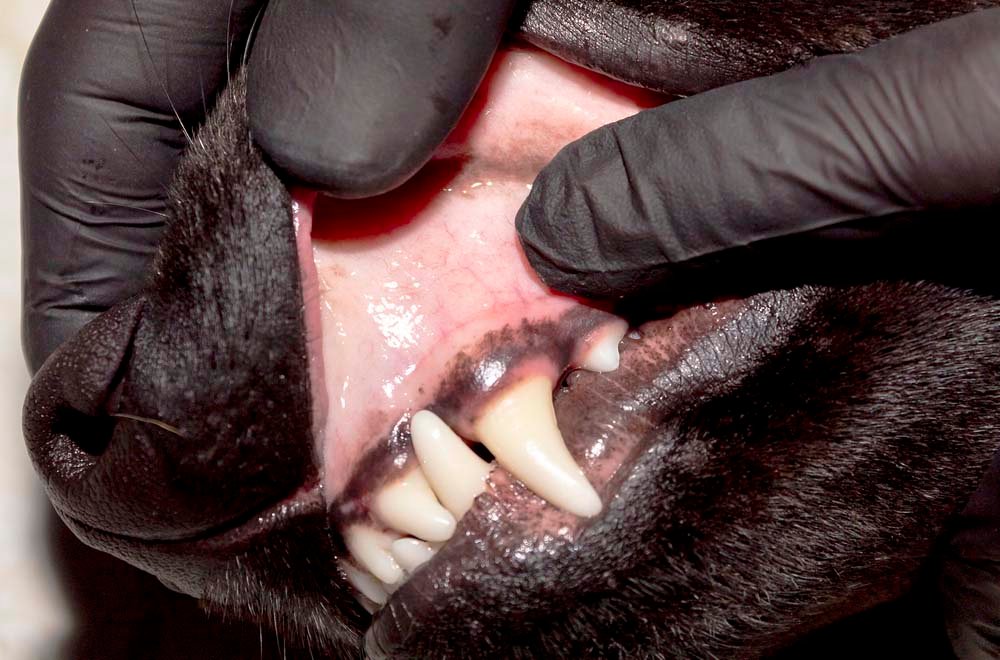Black German Shepherd Image
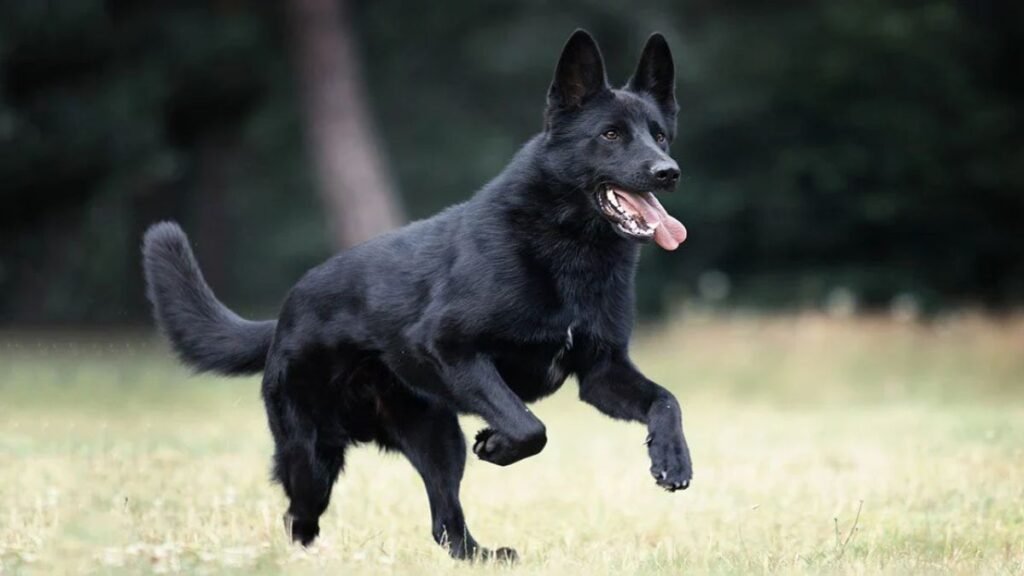
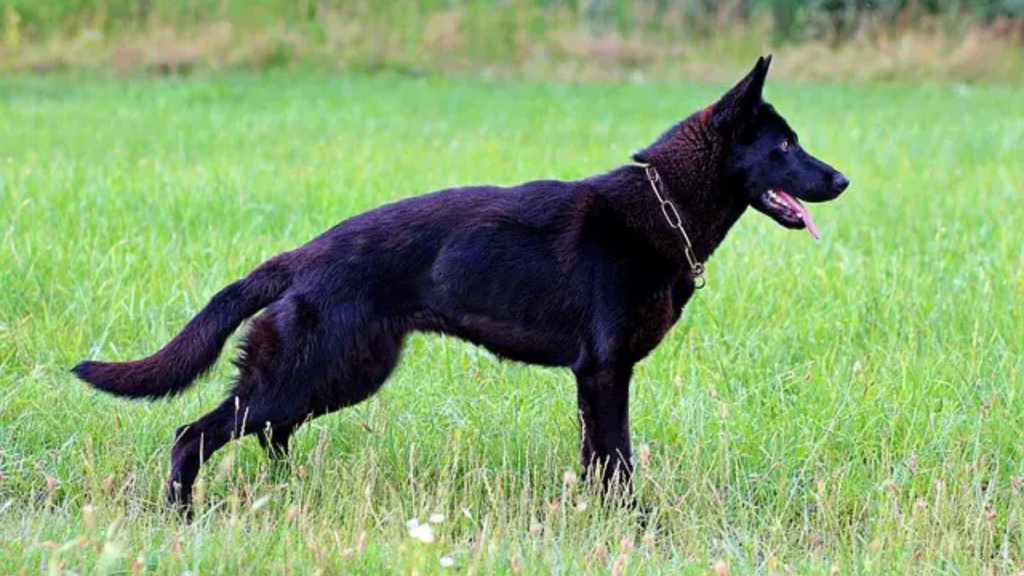

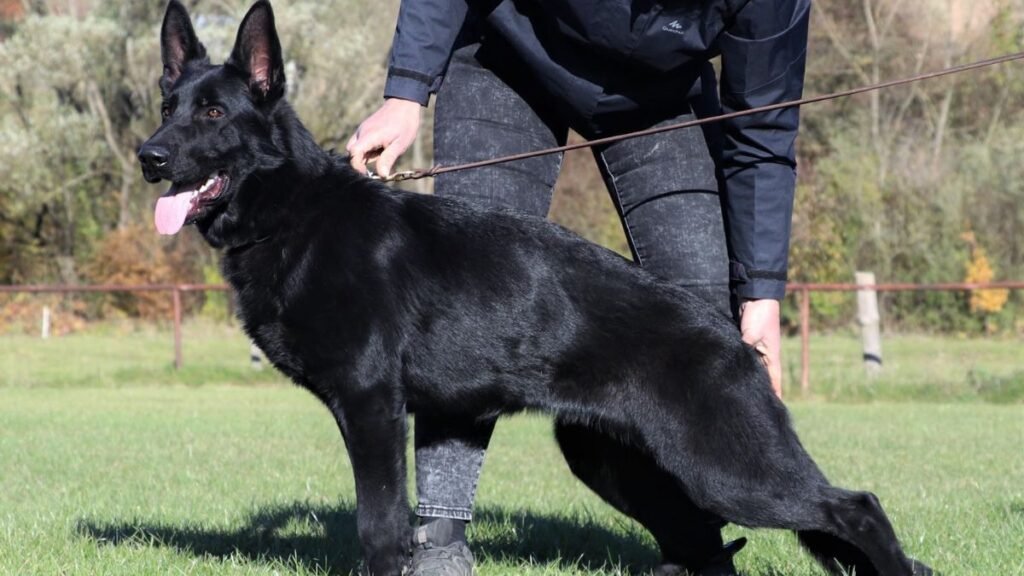
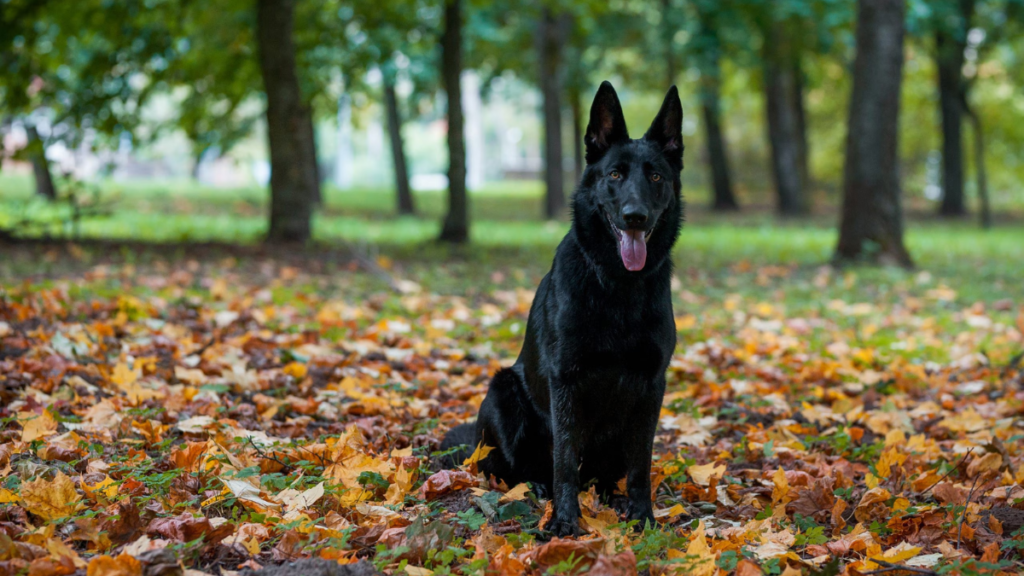
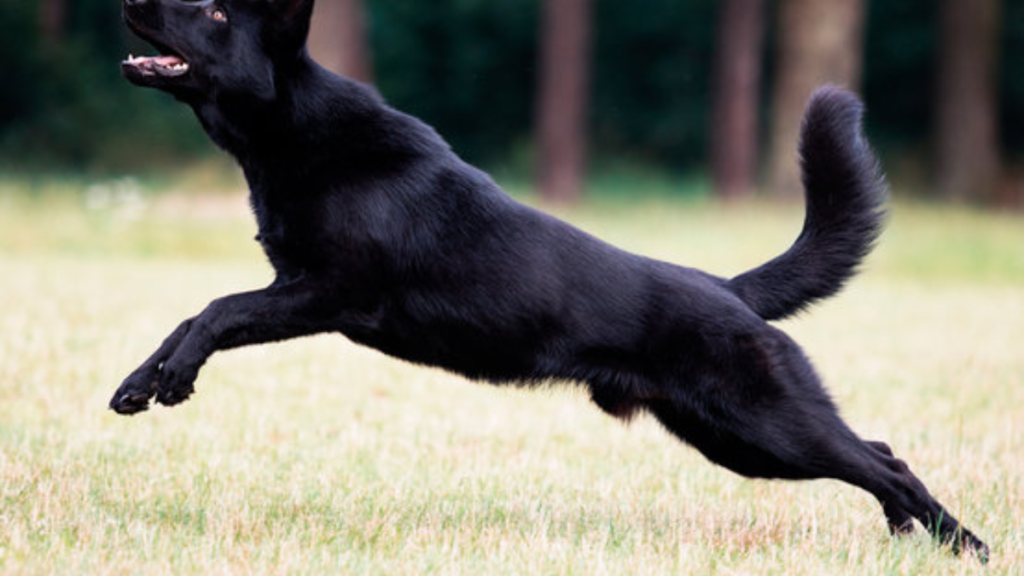
The Black German Shepherd – or BGS, for short if you are searching for a very well-rounded family pet. Maybe the name scares you, but they are harmless family dogs and make such wonderful companions.
Sometimes referred to as the Alsatian if you’re living in the United Kingdom. It is a large working breed from Germany highly prized for its exceptional intelligence and loyalty. The Black German Shepherd is highly intelligent, and with any training applied, they will make sure to use those skills for the best. Due to their instinctual eagerness to work, German Shepherds often serve roles in law enforcement such as bomb detection and forensics. They also thrive in search and rescue and therapy work, making them excellent service dogs. While German Shepherds are predominantly known for roles that are a product of more modern times such as service work and police service, their main function was initially herding.
While black German Shepherds are still quite rare, over the past couple of years they have gained great popularity among families seeking something distinct and fashionable. If you have already decided that you want a black German Shepherd, you will find all that you need, on this page. We’ve assembled a great guide to helping you know whether this true loyal and astoundingly wise pup is worthy to be e yours!

Black German Shepherd Height
22–26 Inches

Black German Shepherd Weight
50-90 Pounds

Black German Shepherd
Lifespan
12 to 14 Years
Black German Shepherd Dog Traits and Personality
Generally regarded as an aggressive dog. This is not true, though. They do have some significant protective instincts because they were bred originally to guard flocks of sheep. If a dog was bred to guard, you can expect it to have guarding instincts today, too. Black German Shepherds are considered to be moderate to very active. They require nearly as much exercise as similar-sized dogs. For example, the activity level of a Black German Shepherd will be similar to or greater than a Labrador Retriever or Siberian Husky.
This breed is known for its heavy people obsession and the fact that it can be easy to train. Provided they are properly trained, they will obey. They do possess some inborn protective tendencies. If you desire a dog that will defend its family, then this breed may be what you are looking for. These dogs do require serious socialization when they are puppies. Without proper socialization, they will sometimes become too defensive of their family and surroundings.
These are not the friendliest canines. They are man-oriented, though not with unknown people. This makes them mostly aloof in the presence of strangers. Worst case, they usually ignore a stranger. They may be ill at ease otherwise.
- Family
- Social
- Physical
- Personality
| Friendliness | Friendliness Level 3 Star |
| Good With Other Dogs | Good With Other Dogs Level 2 Star |
| Good With Kids | Good With Kids Level 4 Star |
| Openness To Strangers | Openness To Strangers Level 3 Star |
| Playfulness Level | Playfulness Level 5 Star |
| Watchdog/Protective Nature | Watchdog/Protective Nature Level 5 Star |
| Adaptability Level | Adaptability Level 5 Star |
| Shedding Level | Shedding Level 5 Star |
| Coat Grooming Frequency | Frequency Level 4 Star |
| Drooling Level | Drooling Level 3 Star |
| Coat Type | Double Coat |
| Coat Length | Medium |
| Trainability Level | Trainability Level 5 Star |
| Energy Level | Energy Level 5 Star |
| Barking Level | Barking Level 4 Star |
| Mental Stimulation Needs | Mental Stimulation Needs Level 4 Star |
Black German Shepherd Dog Temperament
Like most dogs, the Black German Shepherd thrives on early and frequent socialization with pets and people of all ages. They are very friendly and affectionate, to say the least, but warm up to others gradually. Yet, they make extremely loyal companions to each of their family members!
The black GSD just loves having something to do and will invent work if none exists. He’ll make his job protecting and watching over the family as a household pet. His adorably alert ears keep him on guard at all times, letting you know something’s going on within or outside of the house. He will be upset when he can’t find you, nor will he take kindly to a long period out of your line of sight.
Suitable best for families staying at home for most, if not part, of the day, the black German Shepherd becomes prone to suffering from separation anxiety when left out for long. This loneliness tends to cause excessive barking and even other destructive habits.
That being said, owning large breeds or even merely being an inexperienced parent of any type of dog can help; again, large German Shepherds and related breeds must receive significant amounts of exercise and space to thrive or avoid falling into negative behaviors.
Also Read: White German Shepherd Dog Temperament | Maltipoo Dog Breed Dog Temperment
History of the Black German Shepherd Dog Breed
This means that a Black German Shepherd puppy can be gotten either through breeding two black GSDs, or a black and tan GSD can breed and give birth to a puppy which is a black German Shepherd. The difference is that black GSDs are black at birth while the German Shepherds are recognized by the American Kennel Club (AKC) together with the black colour.
It wasn’t until 1899 that the first German Shepherd dog came on the scene through a purchase made by Von Stephanitz in a dog named Horand von Grafrath. He went on to establish the Society for German Shepherd Dogs with Honrand being the chief poster dog. This breed standard emerged from that single dog and was among the fastest breeding into some of the world’s most populous breeds.
Also: History Of Belgian Malinois Dog |
Healthy Food Diet For Black German Shepherd Dog
A black German shepherd should be fed high-quality kibble that’s rich in protein, certified by veterinary nutritionists, and formulated for their size, activity level, and age. The food should also follow AAFCO standards.
Most black German shepherds will require around 2.5 to 3.5 cups of kibble per day, split across two different meals, though you can work out the exact amount of calories your pup should be consuming with a pet food calculator. You can also speak to your veterinarian for guidance. Since black German shepherds are prone to bloat, it’s important to take precautionary measures with their food. Avoid feeding them immediately after strenuous exercise and invest in a slow-feeding bowl.
Black German Shepherd Feeding Chart
| Age | Weight | Required Diet |
| 0-3 Months | 44-55 lbs | 7-8.5 oz |
| 3-5 Months | 57-66 lbs | 9-10 oz |
| 5-7 Months | 66-88 lbs | 10-13 oz |
| 7-12 Months | 88-97 lbs | 13-19 oz |
| 1-12 Years | 88-110 lbs | 18-21 oz |
Also Read: Best Healthy Food Diet of German shepherd Dog
Health Issues For Black German Shepherd Dog
Black German Shepherds have common health issues which German Shepherds have, let’s go through them one by one:
- Hip dysplasia: In this hip socket or femur bone is deformed, thus may cause pain stiffness, and disability in dogs.
- Osteoarthritis: In this disease cartilage in the joints wears down, which causes inflammation and stiffness.
- Exocrine Pancreatic Insufficiency (EPI): The pancreas fails to produce the enzymes needed for digestion.
- Allergies: A condition in which a dog reacts adversely to ingredients in food or treats, including animal proteins, grains, dairy, root vegetables, or preservatives.
- Anal Furunculosis: A condition causing ulcers and inflammation around the anus, resembling Crohn’s disease in humans.
- Degenerative Myelopathy (DM): A terminal disease that attacks the spinal cord and nerves. It causes a progressive loss of mobility and sensation in the limbs.
- Spinal Disease: This is a condition that affects the spinal cord and nerves.
Vaccination For Black German Shepherd
- 6–8 weeks: You should provide your dog DHPPi L vaccine every every 3–4 weeks.
- 9–10 weeks: Give the first booster shot of the DHPPi L vaccine
- 12–16 weeks: Give your dog the second booster shot DHPPi L vaccine and the rabies vaccine
- 12–16 months: Give the DHPPi L vaccine and the kennel cough vaccine
- Every year after 1 year: every year Balck German Shepherd should have Bordetella and leptospirosis vaccines
Black German Shepherd Dog With Children And Other Pets
A well-exposed Black German Shepherd trained would, of course, make a fine playmate to the children, especially in puppyhood; several owners view their Black German Shepherd to be just that little blend of nanny and bodyguard; they care so gently, though with full-fledged guard instinct for all young members in a family but might bump, especially the bigger kind, to toddler or those small little siblings. Their more quiet nature translates to caution around unknown children, but reliability typically trumps that.
A Black German Shepherd can get along well with other pets if it is socialized early. Still, it will require careful management concerning the introduction, especially to cats, which are smaller animals and prey for Black German Shepherds, prone to chasing or herding based on instincts. Training and supervision ensure harmonious interactions among pets in the house.
How to Train a Black German Shepherd Dog?
Black German Shepherds excel in training. GSDs by nature are protective guardians, socialization is extra important so that your puppy learns which strangers are friendly and not a threat at the initial age (6 – 12 weeks). This is also a good time for crate training.
Crate training is an invaluable tool for facilitating housetraining, which almost all GSDs take quickly and easily.
The Black German Shepherd Dog’s work ethic is legendary, and you can encourage your dog’s best-working traits with early and ongoing training. GSDs excel at obedience, so begin teaching your puppy basic commands like sit, down, and stay, as well as loose-leash walking, from an early age.
Begin teaching your GSD to come when called as soon as possible. It takes a lot of time, practice, and patience to get a reliable recall.
Learning to control their impulses is important, it can be one of the most important ways to curb problem behaviors to which this breed is prone if allowed to become bored.
Black German Shepherd dogs may not reach an adult level of maturity before the age of two or three (and males tend to reach this stage later than females). So continue to work on impulse control, improve obedience skills, and advance to training in more focused activities like tracking, scent work, protection work, agility, and herding.
Also Read: How to Train German Shepherd Dog? | How To train You maltipoo Dog?
How to Take Care of Black German Shepherd Dog?
Black German Shepherd dogs are a very energetic breed and need training and exercise daily to prevent them from getting into trouble. They tend to best suit an active family or experienced pet parent. For Black German Shepherd puppies, socialization and consistent training are very crucial to make them grow confident and well-mannered.
1. Skin Care
Black German Shepherds require baths only a few times in the year. Washing them with a dog-specific shampoo during their major shedding season would help minimize hairs around your place.
2. Coat Care
These are heavily shedding dogs, and if their parents brush them for loose hairs frequently, say within a couple of days, these dogs are fairly easy to handle. It can be greatly eased by using some dog brushes, which grab loose hairs on their undercoat.
3. Eye Care
Since Black German Shepherds tend to be prone to eye diseases, it would do your dog good to monitor its eyes for any changes. It is particularly important if you live at a high altitude or where there is a very high UV ray index.
4. Ear Care
While keeping your dog’s ears clean is very important, ear cleanings should only be done when there is an issue or visible debris in the ear. Overbathing, excessive swimming, and having to use ear cleansing liquid all too often add excess moisture into your dog’s ear and may cause bacterial growth, resulting in an ear infection.
5. Nail Care
Another very important fact is that an overgrown Black German Shepherd’s nails should be trimmed regularly unless their regular daily routine could wear the nails down naturally. Overgrown claws are likely to break.
Parenting Tips For a Black German Shepherd Dog
1. Regular Exercises
Black German Shepherds are outstanding animals in every sense, and it is easy to see why. GSDs are naturally energetic and require dedicated time daily for them to burn out. They need at least 60 minutes of daily physical exercise like running and playing fetch in a park. A fit dog is a happy dog and one that is exercised regularly will not only be happy, but healthy too.
2. Grooming Needs
Be prepared to keep your vacuum cleaner handy. GSDs have thick coats, so they will shed a considerable amount of hair. Grooming your GSD will take up some of your time too. You are going to give your pet a comb down at least 3 times a week. But you won’t need to bathe your dog too often (unless instructed by your vet).
3. Nutrition Requirements
Staying healthy and active, as a Black German Shepherd, demands wholesome and well-rounded meals designed just for their type. Try something like IAMS™ and Proactive Health™ – high-quality, uniquely formulated food, especially for Black German Shepherds. This recipe is a combination of beet pulp and prebiotics (FOS) to support healthy digestion, calcium, magnesium, and other minerals and vitamins to promote the health of the heart, and Omega 6 and 3 fatty acids to promote the health of the skin and coat. We suggest dividing their intake in a day into two meals.
4. Regular Vet Checkups for Diseases Black German Shepherds are Prone
As is the case with most breeds, German Shepherds are not immune to diseases either. But here are some of the diseases they are often known to be afflicted with. Hip and elbow dysplasia, Skin Diseases, degenerative myelopathy, inherited eye diseases, exocrine pancreatic insufficiency, skin and heart disease, and thyroid disease. Regular vet checkups and a healthy diet will help your pet to avoid all these diseases.
Black German Shepherd Dog Price
The Black German Shepherd price in India ranges from 7000 INR (Approx.) Price – 16000 INR (Approx.). It is based on various factors like the puppy’s coat colour, age, breed type, location, and many more. The black German shepherd is an exceptionally rare but beautiful purebred pup. While his coat colour may give off a mystical flair, his personality is certainly no mystery: He’s affectionate, intelligent, and devoted to his owner.
Quick Facts!
- It is said that about a 7% – 10% chance of producing a black German shepherd will occur during normal breeding. Some breeders target the production of solid black dogs, though.
- Since a puppy that is of solid black colour may be harder to come by, the price of a puppy that is of a solid black colour tends to be higher than a puppy of a more common colour.
- To produce a black German shepherd, both parents must carry recessive genes. To be born a black dog means that the dog must have a black recessive gene from each parent.
- Black German shepherds are herding working dogs. They are social, smart, highly trainable, and very active.
- Shepherds are strong, agile, and muscular. They are alert, curious, and lively. They have large chests and have smooth curves rather than harsh angles.
Where & How To Adopt Black German Shepherd?
Your best option for adopting a black German Shepherd in India is by contacting local animal shelters and rescue organizations in your locality, especially those that handle large breeds, via online portals like Facebook groups dedicated to dog adoption, contacting the PawNpets websites, search for available black German Shepherds, and get a perfect pet for your family.
FAQs
Q1. What to know about black German Shepherds?
These smart dogs are highly responsive to training and can be therapeutically beneficial to the police and disabled people. Black German Shepherds do not like to be alone. They need to be around people and in stimulating environments. They are active dogs who love to be outdoors.
Q2. How long does a black German Shepherd live?
They have an average lifespan that falls in the range of 9-13 years. Numerous factors contribute to their longevity. It will be important to note these factors to try to extend their lives as long as possible.
Q3. How long does it take for a black German Shepherd to grow?
By the German Shepherd weight chart, you can see these dogs reach up to three years old but most growth is attained in 24 months.
Q4. Are black German Shepherds more expensive?
Generally, a Black German Shepherd will be costlier than a normal German Shepherd due to the rare nature of the coat and color. Buying an adult dog will probably be cheaper than buying a puppy.
Popular Breeds in India
| Maltipoo Dog Breed | Cockapoo Dog Breed |
| French Bulldog Breed | Golden Retriever Breed |
| Chiweenie Dog Breed | German Shepherd Rottweiler |
| German Shepherd Dog Breed | Papillon Dog Breed |
| Cavapoo Dog Breed | Border Collie |




